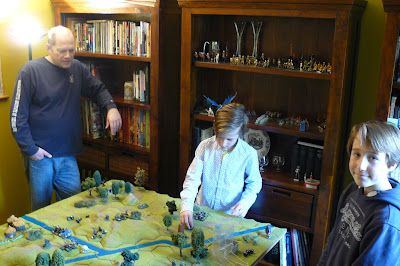Anyway, most of these discussions usually re-iterate the same arguments:
- The hobby is greying! Well, I don't know about that. What is usually meant is that the gaming group the poster belongs to is greying. And that's quite natural. Wargaming is a social hobby, often played informally among friends. So, unless you are part of a regular gaming club with a lot different age groups represented in the membership, it is quite natural that your own little window on the hobby is greying. Which doesn't mean the hobby itself is greying.
- When I was a kid, I entered wargaming through Airfix. We need more Airfix! This is a false feeling of nostalgia. Everyone had their entry point in the hobby, and what worked 30 years ago is not valid today. The gaming landscape has changed. Teenagers are far more likely to enter the wider gaming hobby through computer games. What was a gateway once, most likely is not a gateway anymore a decade later. And BTW, we do have an excellent entry point into the hobby that attracts many young kids. It's called Warhammer.
- Conventions should attract non-wargaming visitors! I think this is totally bogus. What would a non-wargamer do at a wargaming show? Shopping? Watching games? Perhaps the latter. But even so, wargaming shows are set up for wargamers, not for non-wargamers. If a local club wants to attract new blood, they should have a game at a local general hobby fair, or a school event, or some other event in their local community. Sure, occasionally there might be someone who wanders in at a wargaming show completely by accident and gets the bug. But those are the exceptions. Overall, it seems a bad strategy. Moreover, how many wargamers have actively visited a hobby show of another hobby?
- We need more games of type X! Fewer figures! More figures! More history! Less history! Simpler rules! ... This argument often simply states the gaming preferences of the person voicing this argument. We have products in the wargaming market that wargamers are willing to buy. The buyers drive the market. It might be that the hurdle for entering a specific type of game is very high. E.g. if you want a Napoleonic battle with 500 figures on each side, well yeah, it takes some years before you reach that level. But that's ok. Those are the type of games for wargamers that have a life-long commitment. It makes no sense to have entry games that give a teenager an outlook for that type of game. Teenagers also want to drink whatever their mates are drinking (cheap beer, lousy cocktails, whatever the hype is). A teenager is not going to be interested in drinking fine whiskys or wines. Keep that for later in life.
- First, I am not sure we should do anything. Do we need to actively attract young blood? If people are not interested anymore in a specific hobby, the hobby will die. So what? Many hobbies have disappeared over the years. Wargaming will disappear as well, some day.
- Wargaming does not have a regulatory body as some other sports (or even hobbies) have (and let's keep it that way!), so we cannot launch grand recruiting campaigns. So, every individual wargamer should make his hobby known to younger people if he feels strongly about the issue. Not through grand initiatives, but simply by introducing your own kids, nephews, their friends, ... Sooner or later, one kid might become interested, and perhaps not pick wargaming up immediately, but several years later he might remember he had fun playing with toy soldiers. That's a much more effective way of spreading the word. Sure, you will not see immediate effects (as in, I need regular opponents now!), but in the long run, it will pay off.
- Don't panic! Gaming is a very diverse hobby, and mainstream gaming preferences have shifted over the years. Once upon a time, board wargaming (Avalon Hill!) or even miniature wargaming were the #1 gaming choice. Then roleplaying games took over. Then card collecting games. Now German-style boardgames are all the rage. Computer gaming has become a much larger hobby all by itself. A gaming geek in his teens will not turn to miniature wargaming in the current gaming landscape as his first choice. Face it, miniature wargaming is only a small niche within a niche of the gaming hobby. There's no reason to panic. People will find the way sooner or later.
- Accept fantasy and scifi as proper wargaming genres. In other words, embrace the wide variety of wargaming styles and periods. Too often, I hear grumpy grognards saying that fantasy is not proper wargaming, so it doesn't count. Sure, it is not historical wargaming, and there are some differences in approaching how you play the game, but does that really matter? Historical wargaming as we know it today also is something that only originated after WW2. Gaming preferences, even within miniature wargaming, change over the years. It used to be big battles with big units, now it's more small games with small warbands. 5 or 10 or 20 years from now it might be something else. What's the proper way to play with toy soldiers anyway?
And here's my own little effort of recruiting new blood: http://snv-ttm.blogspot.be/2015/11/two-new-recruits.html





























